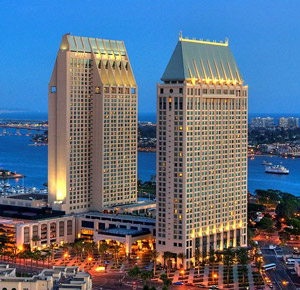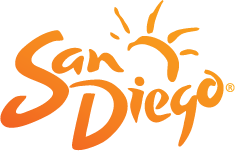
Foundation Leadership Forum
January 26-28, 2020 ❘ Manchester Grand Hyatt ❘ San Diego, California
Rates and How to Book

Foundation Leadership Forum 2020 will be held at the Manchester Grand Hyatt San Diego, 1 Market Place, San Diego, CA 92101.
AGB has secured a room block for Foundation Leadership Forum attendees at a group rate of $299 per night (exclusive of taxes).
Once you have registered for the Forum, you will receive a hotel reservation link in your meeting registration confirmation.
Deadline for reserving a room at the group rate is January 2, 2020.
A few tips:
- Reservations should be made in the name of the person registered for the 2020 Foundation Leadership Forum. Multiple reservations under the same name will not be accepted.
- Your credit card will be charged a (1) one-night deposit to guarantee each individual reservation.
- All reservations must be made online through the reservation link provided in your meeting reservation confirmation.
For questions or assistance, please send an email to registrar@agb.org.
Things to do in San Diego
AGB’s Foundation Leadership Forum is the only national conference of its kind. Each January university and college foundation board members and chief executives from across the country join campus presidents and other senior staff for two and a half days of ideas, discussion, learning, and networking.
Focused on governance issues facing IRFs and their boards, the Forum creates opportunities for board leaders and executive teams to share insights, ask important questions, and learn how to create solutions-based strategies founded on best practices. The program strikes a balance between high-level discussions that address today’s—and tomorrow’s—challenges and guidance on practices that have solidified AGB’s reputation as the gold standard for effecting excellence in higher education governance.
San Diego is known as “America’s Finest City.” Famous for its miles of white-sand beaches, gorgeous sunshine, and warm weather, the city offers fun attractions, historical architecture, and fabulous choices for foodies and wine lovers.
Here is the official link to San Diego Tourism’s website. You can also check out travel tips and information about attractions, dining, and things to do while visiting San Diego from the Lonely Planet and Condé Nast.

Getting to San Diego
By Plane
The major airport is San Diego International Airport (SAN), formerly called Lindbergh Field. All airlines depart and arrive at Terminal 1 and Terminal 2. Free, color-coded shuttles loop the airport and match the parking lot they serve: Lot 1 (green) on Harbor Drive is for long-term parking, and Economy Lot (blue) on Pacific Highway is for short-term parking.
If you need travel assistance at the airport, airport ambassadors are stationed at the information centers in both terminals.
San Diego International Airport, 3225 N. Harbor Drive, off I–5, San Diego, CA 92101, (619) 400–2400; www.san.org
Ground Transportation
San Diego International Airport is three miles from downtown. Shuttle vans, buses, and taxis run from the Transportation Plaza, reached via the skybridges from Terminals 1 and 2. Metropolitan Transit System’s Flyer Route 992 feature red-and-white-striped buses that serve the terminals at 10- to 15-minute intervals between 5 am and 11 pm. These buses have luggage racks and make a loop from the airport to downtown along Broadway to 9th Avenue and back, stopping frequently within walking distance of many hotels; they also connect with the San Diego Trolley and Amtrak. Information about the Metropolitan Transit System’s shuttles and buses, the San Diego Trolley, and COASTER commuter train can all be found on the joint transit website www.transit.511sd.com.
And you can always use Uber and Lyft to get around San Diego and the surrounding area.
By Train
If you plan to travel by train you will need to travel to Los Angeles or Santa Barbara first and change trains for the trip to San Diego.
Amtrak’s Pacific Surfliner route offers 11 daily round-trip services between San Diego and Los Angeles and five between Santa Barbara and San Diego. For additional train travel options, reference the Southern California Passenger Rail Timetable, which combines the schedules of the Pacific Surfliner, other Amtrak trains, Metrolink, and COASTER commuter trains.
By Car
Keep reading for a geographical overview of how to get to San Diego if you plan to drive. More likely, though, you’ll just use Google Maps, Waze, and rely on your GPS!
North/South Routes
- Interstate 5, originates at the Canadian border and ends at the Mexican border. I-15 enters California southwest of Las Vegas and extends to San Diego. I-5 comes down through Los Angeles then heads for the coast; nearing San Diego it bisects the University of California San Diego campus at La Jolla, skirts Mission Bay Park, and passes Old Town before entering the city center.
- I-15 comes inland through Las Vegas and San Bernardino County, continuing south through Escondido, Poway, and other northeastern suburbs, then bypasses downtown San Diego and terminates at I-5 just south of the city proper. SR 163 (Cabrillo Freeway) leaves I-15 at the Miramar Marine Corps Air Station, swings southwestward through Balboa Park, interchanges with I-5, and finally becomes 10th Avenue in the heart of San Diego.
From the South
- The main route is I-5, which begins at the Mexican border, passes along the east side of San Diego Bay, then heads for the downtown area.
- I-805 is the north-south bypass. It leaves I-5 north of La Jolla and rejoins I-5 near San Ysidro, just north of the Mexican border customs stations.
From Points East
I-8 enters California at the Colorado River just west of Yuma, AZ. The interstate roughly parallels the Mexican border to the town of Boulevard. From there it arcs northwestward across the San Diego Mountains, cresting at more than 4,000 feet before descending into the eastern suburbs. After crossing the major north-south freeways, I-8 comes to an end at Ocean Beach, a short distance northwest of downtown San Diego.

